
African literary gems: Poetry books you must read
What's the story
African poetry is a treasure trove of voices and experiences, representing the continent's illustrious cultures and histories. Academics and lovers of the art have added to this literary gem, creating pieces that echo across the globe. Here are some of the most powerful African poetry books that have taken the world of academia and poetry lovers by storm.
#1
'The Collected Poems of Langston Hughes'
Langston Hughes has been one of the most important poets in African American literature, impacting poets throughout Africa. The Collected Poems of Langston Hughes brings together his work, focusing on the themes of identity, resilience, and social justice. Known for their rhythmic quality, these poems leave readers deeply affected, making this collection essential to anyone looking to delve into the history of African American poetry.
#2
'A Grain of Wheat' by Ngugi wa Thiong'o
Not just a novel, Ngugi wa Thiong'o's A Grain of Wheat is also a poetic rendition of Kenya's quest for independence. The book addresses issues like colonialism, freedom, and personal sacrifice through lyrical prose. With his knack of weaving history with personal accounts, Ngugi makes this piece an integral part of African literature. Not only can readers learn about Kenya's past, they can also appreciate the author's unique style of storytelling.
#3
'Songs of Enchantment' by Ben Okri
Ben Okri's Songs of Enchantment is part two in his much-acclaimed trilogy that delves into magic realism in an African setting. The book marries poetic language with stunning imagery to bring a world where reality marries mythological elements. Okri's delving deep into spiritual themes along with commentary gives a multidimensional perspective on modern-day issues facing Africa today.
#4
'The Beautyful Ones Are Not Yet Born' by Ayi Armah
Ayi Kwei Armah's novel The Beautyful Ones Are Not Yet Born uses poetic language throughout the narrative. It tackles the problems of post-colonial Ghanaian society during transitional periods. These periods were prevalent after independence from British rule in 1957 until the mid-60s. Through vivid descriptions and symbolic imagery, Armah critiques corruption, disillusionment, and moral decay that thrived during those times.